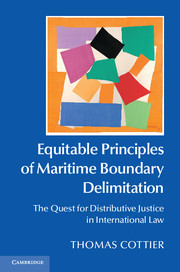 Equitable Principles of Maritime Boundary Delimitation
Equitable Principles of Maritime Boundary Delimitation Book contents
- Frontmatter
- Dedication
- Contents
- List of tables
- List of maps
- Preface
- Acknowledgements
- Table of cases
- Table of treaties and instruments
- Equity revisited: an introduction
- PART I Context: the enclosure of the seas
- 1 The silent revolution
- 2 The new maritime zones: evolution and legal foundations
- 3 Distributive effects of the enclosure movement: an assessment of global equity
- PART II The new boundaries
- PART III Delimitation based on equity
- Appendix I Maritime boundary agreements 1942–1992
- Appendix II General maps
- Bibliography
- Index
3 - Distributive effects of the enclosure movement: an assessment of global equity
from PART I - Context: the enclosure of the seas
Published online by Cambridge University Press: 05 May 2015
- Frontmatter
- Dedication
- Contents
- List of tables
- List of maps
- Preface
- Acknowledgements
- Table of cases
- Table of treaties and instruments
- Equity revisited: an introduction
- PART I Context: the enclosure of the seas
- 1 The silent revolution
- 2 The new maritime zones: evolution and legal foundations
- 3 Distributive effects of the enclosure movement: an assessment of global equity
- PART II The new boundaries
- PART III Delimitation based on equity
- Appendix I Maritime boundary agreements 1942–1992
- Appendix II General maps
- Bibliography
- Index
Summary
The quest for global equity in maritime law
With a view to preparing the ground for rules and principles on maritime boundary delimitation, it is essential to consider the global distributive effects of the new law of the sea, particularly those of the continental shelf and the EEZ. Global, ‘macro-economic’ distributive effects and the changes brought about by these concepts may be relevant in the succeeding process of ‘micro-economic’ maritime boundary delimitation between states. Both levels operate with elusive notions of equity, and it is yet unclear how they interrelate. A brief study of distributive effects in law and the economics of the enclosure of the seas is therefore necessary to define the scope of equity in the context of maritime boundary delimitation. It prepares the ground for the clarification of the relationship of what may be called global equity in the law of the sea and the use of equity in maritime boundary delimitation in subsequent chapters of this book.
The history of the enclosure movement reveals that the EEZ and the Area became an important part of the movement for a new international economic order (NIEO) from the 1970s to the 1980s. While the legal concept of the shelf emerged from policies put forth by industrial and colonial powers, the subsequent developments of the EEZ and the Area – under the concept of common heritage – were largely promoted by developing countries (LDCs) under the flag of equity, with the hope of achieving fundamental changes in the allocation of income, wealth and resources. In the 1970s, UNCLOS III became a central operation in the pursuit of power sharing and of distributive justice or global equity:
The developing countries have found that the international conferences on the law of the sea provide them with a unique opportunity for ensuring that their own ideas and needs are borne in mind in the formulation of the rules of international law and that the rules are formulated on the basis of equity.
- Type
- Chapter
- Information
- Equitable Principles of Maritime Boundary DelimitationThe Quest for Distributive Justice in International Law, pp. 130 - 176Publisher: Cambridge University PressPrint publication year: 2015


